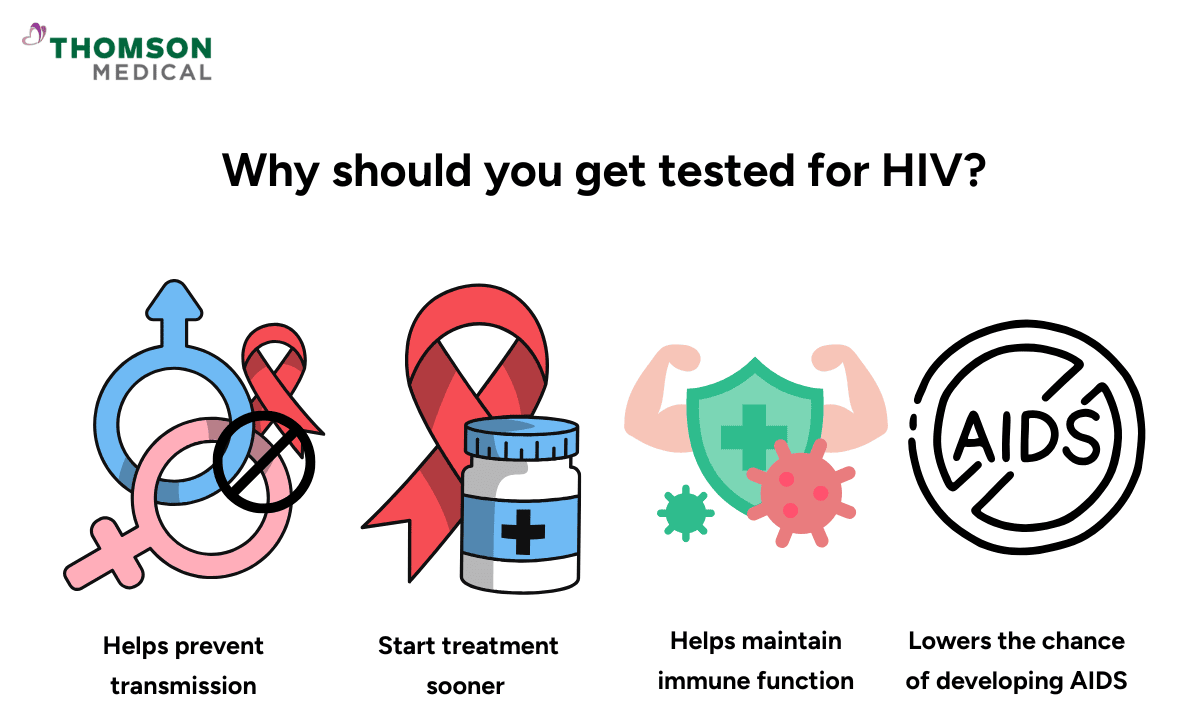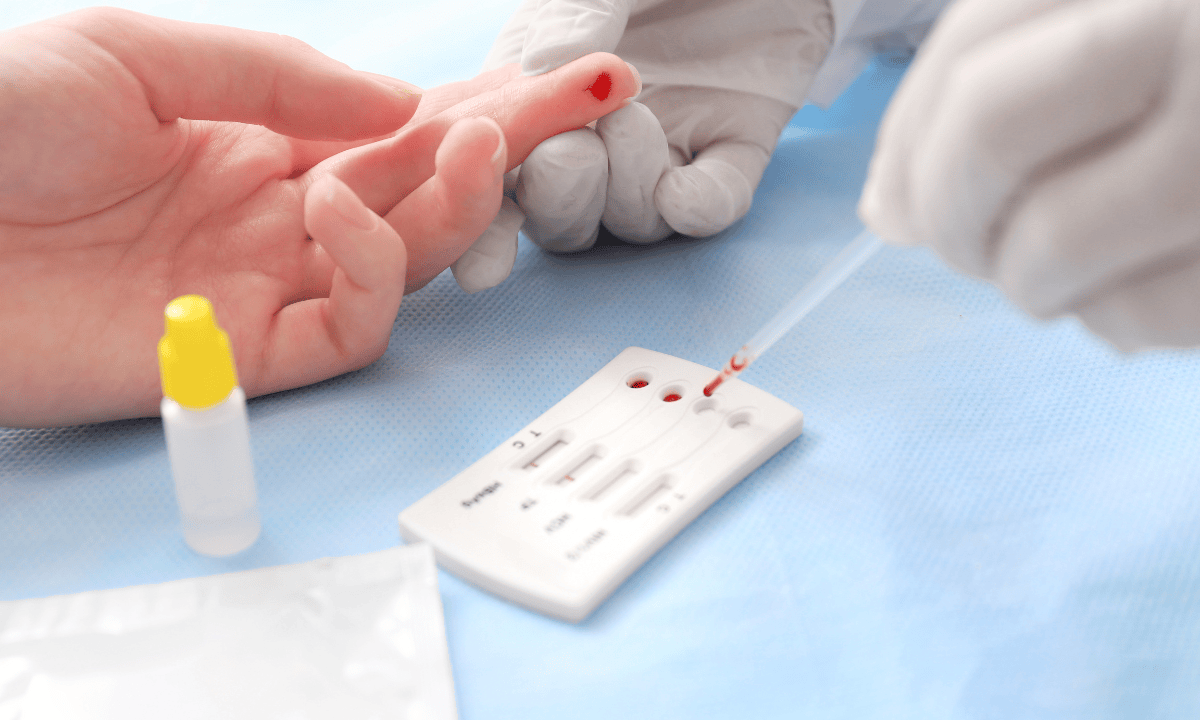What are HIV and AIDS?
HIV (Human Immunodeficiency Virus) is a virus that weakens your immune system — your body’s natural defence against illness. When you have HIV, the virus specifically targets your white blood cells, weakening your ability to fight off other diseases.
When your immune system suffers significant damage, you develop AIDS (Acquired Immunodeficiency Syndrome), the advanced stage of HIV infection.
When you have HIV:
Your white blood cells become infected
Your immune system gradually weakens
You become more vulnerable to other illnesses like tuberculosis, various infections, and certain cancers
HIV spreads through specific body fluids from an infected person, including:
Blood
Breast milk
Semen
Vaginal fluid
HIV symptoms vary from person to person. Some people may experience flu-like symptoms soon after infection, while others might not notice anything until later stages.
What is HIV testing?
HIV testing helps find out if you've been infected with the virus. During the test, healthcare professionals look for specific signs of the virus in your:
Blood
Urine
Saliva sample
The test specifically identifies:
Antigens (proteins from the virus itself)
Antibodies (proteins your body makes to fight the virus)
HIV testing can tell you if you have the virus, but it does not tell you:
How long you’ve had HIV
Whether you have developed AIDS (the advanced stage of the infection)
The first step is to undergo an HIV test to determine your status. The earlier you are tested, the sooner you can be treated—and that helps you stay healthy and minimises the potential spread of the virus to others.
Why should you get tested for HIV?

Many HIV-positive people are unaware of their infection, especially in the early stages when there may be no symptoms. This is why regular testing is important — getting tested can protect your health and the health of others.
Early testing matters because it:
Helps prevent the spread of HIV:
Knowing your status allows you to take steps to protect your partners.
Enables early treatment:
Starting treatment early can slow the virus’s effect on your immune system.
Improves long-term health:
With proper care, people with HIV can live long, healthy, and fulfilling lives.
Reduces the risk of complications:
Treatment lowers your chances of developing AIDS and other serious illnesses.
HIV is a manageable condition with early and appropriate medical care — and it all begins with getting tested.
When to get tested?
Knowing when to get tested helps protect your health and others around you. While everyone should be tested at least once, some people may need to get tested more often, especially if they are at higher risk of being exposed to HIV.
High-risk groups
According to the Centres for Disease Control and Prevention (CDC), regular HIV testing every 3 to 6 months is recommended for people in higher-risk groups, including:
Men who have sex with men
People who inject drugs, especially if needles are shared
Anyone who has unprotected sex with new or multiple sexual partners
Sex workers or those who are sexually active
Frequent testing helps detect HIV early, which makes treatment more effective and reduces the risk of passing it on to others.
Pregnant people
If you are pregnant, you should consider HIV testing.
As early as possible during your pregnancy
Again in the third trimester, ideally before 36 weeks, if your first test was negative
Regular testing is an important part of taking care of your health if you fall into these categories. Early detection leads to better outcomes for both you and, in the case of pregnancy, your baby.
If you're concerned about possible exposure to HIV, have had unprotected sex, or simply want peace of mind, it is important to speak with a healthcare professional. Request an appointment with Thomson Medical for a comprehensive HIV screening.
Our specialists will support you every step of the way, from testing to results—and, if needed, help you begin treatment with a personalised care plan tailored to your health and lifestyle.
Our doctor
Loading...
How do I prepare for an HIV test?
In most cases, you do not need to do anything special to prepare for an HIV test. The process is quick and straightforward and doesn’t usually require any advance preparation.
If you're having an oral fluid test:
Avoid eating, drinking, or using mouthwash for at least 30 minutes before the test. These precautions help make sure the sample of saliva collected from your mouth is accurate.
For blood or urine tests, no specific preparation is needed.
If you have any questions or concerns, your healthcare provider can explain what to expect before your test.

Types of HIV tests
There are 4 types of HIV testing:
Antibody test:
This test examines your blood, urine, or oral fluid to find antibodies—special proteins your body makes to fight HIV.
Your body typically produces these antibodies within 3-12 weeks after infection.
Antibody/antigen test:
This test looks for both antibodies and antigens:
It is usually done with a sample of blood.
It can detect HIV earlier than an antibody-only test — typically within 18 to 45 days after exposure.
Nucleic acid test (NAT):
This advanced test can detect HIV very early—as soon as 10 to 33 days after infection.
It works by finding the virus's genetic material (RNA or DNA) in your blood sample.
Viral load test:
This test measures the amount of HIV in your blood. It serves two important purposes:
Monitoring how your HIV infection is progressing
Evaluating how well your treatment is working
Your healthcare provider will recommend the right test based on your risk level and time from exposure.
What to expect from your HIV test results?
The first test you’ll usually have is either an antibody test or an antigen/antibody test. These are the most common tests used for routine HIV screening.
Routine screening tests usually do not involve the NAT. Your doctor might recommend this more specialised test only if:
You have early symptoms of HIV, or
You have recently been involved in high-risk activities that may have exposed you to the virus.
What happens if your test is positive?
If your initial HIV test result is positive, a follow-up test is always done to confirm it. This is done to make sure the first test result was not a false positive.
The confirmation may involve:
Testing a new blood sample, or
Retesting the original sample using a different method
Once the second test confirms the result, your healthcare provider will officially diagnose you with HIV. Your healthcare provider will guide you through the next steps and help you understand your treatment options.
Are there any risks and side effects?
The HIV screening test is very safe and carries minimal risk for you. If your test requires a blood sample, you may experience:
Minor discomfort during the needle stick
Possibly slight bruising afterward
However, veins can vary in size and position from person to person—or even from one arm to the other. This means that, in some cases, it might take a little more effort to find a good vein.
To help make the blood draw easier, it’s a good idea to drink plenty of plain water before your test. Staying well-hydrated can help your veins become fuller and more visible, making the process smoother and more comfortable.
For oral fluid or urine tests, there are very low risks or virtually no side effects at all.
FAQ
How is an HIV test done?
An HIV test is usually done by taking a sample of your blood, saliva, or urine. The type of sample needed depends on which testing method your healthcare provider uses.
What happens if I test positive for HIV?
If you test positive, it means that HIV has been detected in your body. The next step is to speak with your healthcare provider. They’ll help you understand your diagnosis and start you on treatment.
With proper care and antiretroviral therapy (ART), you can live a long and healthy life. Treatment also reduces the risk of passing the virus to others.
You’ll need regular check-ups to monitor your health and make sure the treatment is working well. A positive HIV test may be emotionally stressful, so seek support from friends, family members, or support groups.
Is an HIV test 100% accurate?
HIV tests are very accurate, especially when done at the right time. If you test after the window period (up to 3 months after possible exposure), results are more than 99.97% reliable. Testing too early can sometimes give a false negative, so your doctor might recommend a follow-up test.
How long does HIV take to show?
HIV affects everyone differently:
Acute HIV infection:
You might experience flu-like symptoms (fever, body aches, sore throat, runny nose, cough) about 2–4 weeks after the infection. However, some people have no symptoms at all.
Asymptomatic phase:
After initial signs of infection, you might have no signs of HIV for several years, even though the virus is still damaging your immune system.
Advanced HIV infection (AIDS):
Without treatment, HIV will eventually progress to AIDS, when your immune system becomes severely weakened and you become vulnerable to opportunistic infections.
Can a normal blood test detect HIV?
A routine blood test does not detect HIV. You need a specific HIV test to diagnose the infection. However, in advanced stages of HIV, a regular test of blood might show related issues like low red blood cells, low white blood cells, or low platelets.
If your doctor suspects a risk of infection, they will recommend specific HIV testing.
What is the risk of getting HIV from a single exposure?
The risk per exposure depends on how the virus is transmitted. For example, unprotected sex, sharing needles, or contact with infected blood carries a higher risk than casual contact.
Your healthcare provider can assist you in determining your personal risk and the necessity of post-exposure prophylaxis (PEP). PEP is a course of medication that can offer protection against HIV infection if you've had a possible exposure.
The information provided is intended for general guidance only and should not be considered medical advice. For personalised recommendations based on your medical conditions, request an appointment with Thomson Medical.
For more information, contact us:
Thomson Specialists (Women's Health)
Thomson Women's Clinic (TWC)
- Novena:
6592 6686 (Call), 8611 8986 (WA) - Bukit Batok:
6569 0668 (Call), 8686 3525 (WA) - Choa Chu Kang:
6893 1227 (Call), 8282 1796 (WA) Jurong:
6262 8588 (Call), 6262 8588 (WA)- Katong (female doctor):
6970 2272 (Call), 8611 9020 (WA) - Punggol:
6243 6843 (Call), 8811 0328 (WA) - Sembawang: 6753 5228
- Sengkang: 6388 8125
- Serangoon (female doctor): 6382 3313
- Tampines: 6857 6266
- Tiong Bahru: 6276 1525
